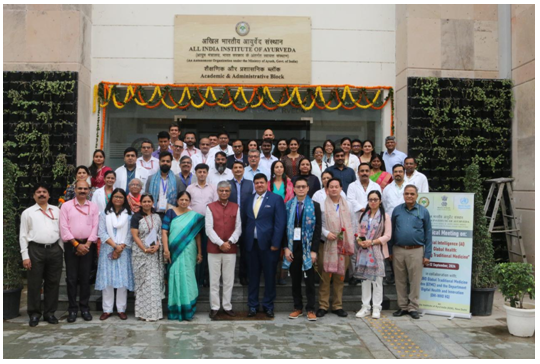New Delhi: The two-day Global Technical Consultation Group meeting on “Artificial Intelligence (AI) for Global Health: Advancing Traditional Medicine” concluded on September 12, 2024, with optimistic projections for the release of a technical brief on AI in Traditional Medicine by October 2024. Organized by the All India Institute of Ayurveda (AIIA) in collaboration with the WHO Global Traditional Medicine Centre (GTMC) and the Department of Digital Health and Innovation (AI and Digital Frontiers Unit), the hybrid event brought together experts from around the world to explore the intersection of AI and traditional medicine.
The event, held on September 11 and 12, 2024, saw participation from 60 experts representing 15 countries, alongside key global organizations such as the World Health Organization (WHO) and the World Intellectual Property Organization (WIPO). The consultation aimed to develop a WHO-WIPO guidance on AI and intellectual property with traditional medicine as a use case, create a global repository on traditional medicine leveraging AI, and establish a training module for traditional medicine experts on AI applications.
In his inaugural address, Secretary of the Ministry of Ayush, Vaidya Rajesh Kotecha, highlighted the crucial role of integrating digital technologies into healthcare. He referenced the National Health Policy 2017, which emphasizes the inclusion of e-health, m-health, cloud computing, IoT, and AI to enhance healthcare delivery systems. Vaidya Kotecha underscored the vision of Ayush Grid—a comprehensive IT backbone for India’s traditional medicine sector—to integrate modern digital tools with traditional medicine, aligning with the principles of Ayushman Bharat.
Prof. Tanuja Nesari, Director of AIIA, expressed enthusiasm about the global consultation, stating, “This consultation is a crucial opportunity to refine the draft policy on AI in traditional medicine. With diverse inputs, we are hopeful about launching the technical brief by October 2024.”
Dr. Manoj Jhalani, Director of Health Systems at WHO SEARO, discussed how AI, through advanced data analytics, could uncover new therapeutic approaches and optimize existing treatments, thereby enhancing the global relevance of traditional medicine.
Sameer Pujari, Lead (AI and Digital Frontiers) at WHO, outlined the WHO-ITU-WIPO led Global Initiative on AI for Health. This initiative aims to facilitate AI integration into health through normative products, such as the upcoming technical brief, and to build a community of practice for knowledge exchange and policy implementation.
Dr. Karthik Adappa, Regional Advisor for Digital Health at WHO SEARO, highlighted the rapid growth of AI in health and the persisting inequities. He pointed to the Southeast Asia Region’s Government AI readiness index, noting the widening gap between developed and developing countries and the need for ethical AI practices.
The meeting was attended by distinguished guests including Fei Jiao from WIPO/UN, Maki Kajiwara from WHO TMC, Dr. Jeremy Y. Ng from Canada, Dr. Kai Siang from Malaysia, and other notable experts and representatives from leading organizations like Wipro and AMRO.





